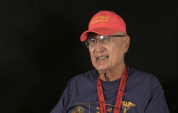4:21 | Hubert Yoshida was fortunate to have a year to train his platoon of Marines before they went to Vietnam in 1965. As they approached the coast, they saw tracers in the hills, so they assumed it would be an assault landing but, when the ramp lowered on the landing craft, what they saw was comical.
Keywords : Hubert Yoshida Japanese-American University of California Berkeley Officer Candidate School (OCS) Vietnam Indonesia Sukarno Qui Nhon assault landing beer Vietnamese supplies Victor Krulak Chu Lai

Hailing from California, Hubert Yoshida's family was forced to live in a camp for Japanese-Americans during WWII. He was just a child but he admired the soldiers with their rifles, unaware that they were there to guard the internees. An uncle and a cousin served in segregated Japanese units and they were his heroes and inspired him to join the Marine Corps.
Hubert Yoshida's platoon had just come in from a big operation when they got the bad news. They had to leave the next day on a bigger one. Operation Utah was an effort to engage an NVA regiment that was reported nearby. Only one thousand Marines and ARVN troops went up against three thousand NVA and VC. It was to be the young platoon leader's bloodiest battle.
Time is funny when you're in combat. For Hubert Yoshida, sometimes it slowed down and, at other times, everything seemed to be incredibly fast. As a platoon leader, he was very busy, trying to keep on top of the situation and manage the fight.
The rotation system in Vietnam was terrible, according to Marine platoon leader Hubert Yoshida. It was the first war where individuals rotated in and out, which was a burden to both units and troops. He tells the story of one young Marine from an Honor Guard outfit who petitioned to go to a combat assignment.
One of the first things Platoon leader Hubert Yoshida was assigned to do, when he got to Vietnam, was to overwatch a road. Every day, he saw men with rifles stopping people on the road, so he took his Marines there to catch them. They didn't catch them but they did get a lesson in guerrilla warfare.
He fully intended to stay in the Marine Corps after his tour in Vietnam but he resigned his commission when he realized the toll it takes on the family at home. He went on to a successful career, still haunted by certain memories from the war.
He thinks about it every night. Hubert Yoshida's experiences led him to write about his bloodiest battle, Operation Utah. He was up for a Silver Star for his actions in this fight and it bugged him for 50 years that it was downgraded to a Bronze Star. As he researched material for his book, he learned something that made him forget about it.
We were fighting for democracy but the side we were on was corrupt. Hubert Yoshida, who was decorated for his actions in Vietnam, has some definite opinions on the war and the warring parties. And on honoring each and every veteran of the war.